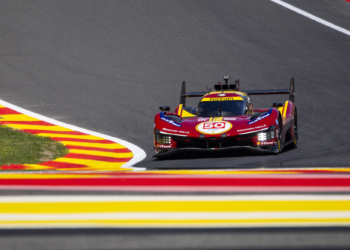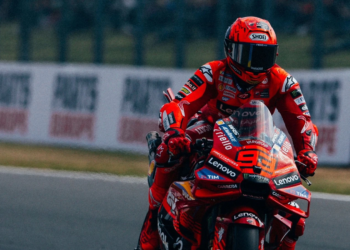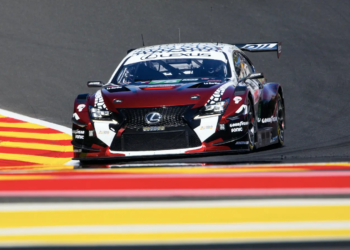After a welcome rest of two weeks following back-to-back races in Austria and Great Britain, the Formula 1 circus roared back into life around the iconic Hungaroring for the 31st running of the Hungarian Grand Prix.
Nico Rosberg entered the weekend only one point ahead of team-mate Lewis Hamilton in the drivers’ championship, with the battle between the two closing significantly after a controversial post-race penalty issued to Rosberg at Silverstone.
With a heavy rain shower striking the circuit during qualifying and Rosberg drastically storming to pole position despite a late spin by Fernando Alonso, the Hungarian Grand Prix had all of the ingredients to be an thriller.
With only several days until the F1 fraternity reconvenes at Hockenheim for the German Grand Prix, allow Grand Prix Times’ Andy Young to bring you five talking points from the Hungarian Grand Prix.
1. Hamilton makes history at the Hungaroring as the advantage swings in his favour
After the marathon of a qualifying session for the Hungarian Grand Prix, Hamilton could’ve been forgiven for being slightly bitter regarding the way in which team-mate Rosberg stormed to a surprise pole position.
Controversy hung over the Hungaroring like the dark rain clouds which loomed overhead only hours before, with question marks over whether Rosberg lifted “sufficiently” during the double-waved yellow flags caused by Alonso.
As it transpired the race stewards were happy that Rosberg did in fact adhere to the rules, as the German maintained his grid position at the front.
If anything the end result only seemed to make arch rival Hamilton even hungrier for success on race day, as after all the points are only awarded for the race.
Once the lights went out Hamilton catapulted into the lead, as Rosberg was left fending off the Red Bull of Daniel Ricciardo on the exit of Turn 1.
From there Hamilton only lost the lead during the two pit-stops, eventually securing his fifth win of the season and his record fifth win around the Hungaroring – making him the most successful driver at the circuit.
More importantly the victory has given Hamilton a six-point lead in the drivers’ championship, the first time he has sat at the top of the championship so far this season. Admittedly there is a lot of racing left to complete in 2016, however there is absolutely no denying that the advantage now well and truly sits on Hamilton’s side of the garage.
Team-mate Rosberg simply must respond next time out on home soil in Germany, particularly with a race victory. Amazingly if Rosberg does manage to win the German Grand Prix ahead of Hamilton in second place, the German would enter the summer break just one vital point ahead in the drivers’ championship.
But if the opposite happens and Hamilton storms to victory once again ahead of Rosberg, then Hamilton will enter the summer break 13 points clear of Rosberg. 13…unlucky for some!
Of course suggesting that victory in Germany will mean championship success for Hamilton is ludicrous at this stage of the season and that is not what I’m suggesting. After all Rosberg’s comfortable lead in the championship from earlier in the season has been steadily eroded by Hamilton so therefore there is nothing to suggest that Rosberg couldn’t do likewise in the latter half of the season.
Especially when you consider the penalties which will almost certainly be heading Hamilton’s way in the next few races due to requiring either a new TC [turbo charger] or MGU-H [motor generator unit – heat] or both.
That would mean Hamilton would be hit with hefty grid penalties, gifting Rosberg a golden opportunity to make hay whilst the sun shines so to speak and score as many points as possible.
But if Rosberg fails to make the most of Hamilton’s expected setbacks due to grid penalties, then the German will almost definitely have a dire situation on his hands.
Hamilton seems to enjoy playing the role of the hunter, and instead of allowing himself to wallow in the dark moments of the Spanish Grand Prix, he seems to have managed to use such setbacks to his advantage and has since bounced back in indomitable form.
Only time will tell whether Rosberg has what it takes to truly take the fight to his team-mate after losing the championship lead, but history suggests that when Hamilton rediscovers his mojo he can become rather hard to conquer.

2. Battle for ‘best of the rest’ intensifies as Red Bull close in on Ferrari
Since storming to three victories last season, Ferrari were intent on hitting the ground running this year and taking the fight for supremacy to Mercedes at the top the championship. As it has transpired Ferrari has instead hit the sporting version of ‘writers block’, with the Scuderia seemingly unable to return to glory.
So far this season the Prancing Horse has felt more like a Prancing Pony, with a handful of tactical errors preventing them from winning races in Australia, Spain and Canada before technical issues materialised and held the team back even further.
Meanwhile Red Bull has wasted no time in gradually making their return to the top spot, winning in Spain in a race which undoubtedly should’ve been Ferrari’s to lose after Hamilton and Rosberg’s collision.
After one victory and five further visits to the podium, Red Bull now sit only one point behind Ferrari in the constructors’ championship with roughly half of the season remaining.
With rumours stating Sebastian Vettel is far from content within Ferrari and Kimi Raikkonen signing an unpopular contract extension with the team, there’s no denying that the Scuderia is far from taking the fight to Mercedes in the championship.
In fact such has Red Bull’s vast improvements been so far this season, one would instead tip Red Bull to begin questioning Mercedes’ authority at the front. Team boss Christian Horner is adamant that Red Bull’s second half of the season will feature further improvements, and this therefore only adds pressure to Ferrari.
There certainly seems to be no imminent sign of Ferrari’s woes improving, with Raikkonen somehow being eliminated from qualifying in Hungary after only Q2, whereas Vettel was comfortablly out-qualified by Red Bull.
After the British Grand Prix I discussed whether Ferrari will actually win a race this year, stating that their only real chances will come in Hungary or Singapore – two races they won last year. Well they certainly failed to trouble the sharp end of the order in Budapest, which leaves only one realistic opportunity for victory this year.
But then again there’s no reason why Red Bull won’t be able to turn up in Singapore later this year and remain ahead of Ferrari, even if it does mean playing second best to Mercedes once again.
Ultimately an atmosphere of intense pressure seems to be lingering over the Ferrari camp, potentially leading to the ‘performance issues’ of late. Prior to the Hungarian Grand Prix team boss Maurizio Arrivabene said Ferrari “cannot fail”, and ultimately they only lost further points to Red Bull.

3. Radio regulations send Jenson Button ga ga
Following Rosberg’s post-race penalty at the British Grand Prix, the FIA decided to issue a further clampdown over what can and can’t be discussed over team radio ahead of the Hungarian Grand Prix, stating that if a team wishes to talk to their driver they must then return to the pits for repairs or to retire.
So it was no surprise when Button became the first driver to fall foul of the renewed radio regulations only a handful of laps into the Hungarian Grand Prix, when the 2009 world champion stated that his McLaren was suffering with a brake issue.
His race engineer responded by instructing Button not to shift through the gears due to a loss of hydraulic pressure, before then urging him to stay out and not return to the pits.
This in turn led to a drive-through penalty for the Briton, which understandably enraged him even further.
“So the brake pedal going to the floor isn't classed as a safety issue? That's quite interesting. Think someone needs to read up on what is safe and what isn’t,” was Button’s heated response to his drive-through penalty.
After the race Button was joined in voicing dissatisfaction over the radio regulations by Toto Wolff, Christian Horner and Maurizio Arrivabene. Statements such as “too many complications” and “over-regulating” were used, with a clear sense of unity over the regulations in question.
Since the European Grand Prix in Azerbaijan the radio regulations have remained a strong talking point within the paddock, and after the British and Hungarian Grands Prix have now unquestionably reached a pivotal breaking point.
Ultimately the outcome is quite clear: the regulations either need to be relaxed slightly or abolished altogether.
Admittedly the constant stream of assistance from a few years ago could’ve been perceived as negative by some fans, with many eager to see the sport return to the days when the drivers were considered as gladiators with manual gears, huge tyres and monstrous 3.5 litre V10 engines.
But the fact of the matter is that F1 is both a team sport and one which thrives off technical innovation, such as incorporating hybrid cars with a green carbon footprint. This in turn will naturally lead to more technically complicated cars being built, and therefore each driver cannot possibly be required to know what every setting and subsetting does on a modern F1 steering wheel. That is where the race engineer comes in, introducing the team aspect of the sport.
Forcing a driver to concentrate on his steering wheel while trying to overtake a competitor at over 200mph is simply too dangerous, and penalising teams and drivers for preventing brake failures and the like with drive-through penalties is unquestionably sending out the wrong message.
And anyway, we all enjoyed listening to the drivers being told things over the radio. Now there is practically a radio silence throughout the majority of the race, with some teams like Force India in Austria even not telling their drivers about potential brake failures for fear of being penalised.

4. Close but no cigar for Jolyon Palmer
So far Jolyon Palmer has endured a difficult debut season in F1, with the 2014 GP2 champion still yet to score a single point for Renault. With team-mate Kevin Magnussen ahead of him in the championship with the team’s only points so far, pressure is continuing to grow on the shoulders of the 25-year-old Briton.
Although Palmer managed to finish a relatively impressive 11th during his debut race weekend in Australia, he has failed to since match or even better that result with the Briton even sometimes ending races and qualifying sessions behind Saubers or even Manors.
With only one race remaining before the traditional summer break, Palmer currently sits tied with both Sauber drivers Marcus Ericsson and Felipe Nasr and the Manor or Rio Haryanto on no points, while team-mate Magnussen has six points to his name, Pascal Wehrlein has one point to his name and even McLaren reserve driver Stoffel Vandoorne has one point after his one race in Bahrain.
During the Hungarian Grand Prix Palmer ran as high as eighth, before settling into tenth position during the closing stages of the race. However, the Briton threw away his chances of securing his first points of the season after a spin at Turn 4.
This drastic mistake came only several laps after his Renault mechanics made an absolutely tremendous pit-stop which enabled Palmer to rejoin the action ahead of Nico Hulkenberg and in that all-important tenth position.
The question now is how much further pressure will this place on the shoulders of Palmer, as rumours continue to lurk within the paddock regarding Mercedes protege Esteban Ocon and his connections with the French manufacturer.
So far this season Ocon has competed in three practice sessions with Renault in Spain, Germany and Hungary, while also testing for Mercedes during the post-British Grand Prix test at Silverstone.
Although there is no doubt that Palmer is a competitive driver, Renault will desperately be hoping that the Briton can finally score his maiden points in F1 very soon. Especially considering the sheer competitiveness towards the rear of the field between Renault, Manor and Sauber.
After securing their financial future, Sauber could prove a threat to Renault if they begin to score points in the latter half of the season and with Manor already on one point it could all become insanely competitive.
Renault will want both drivers firing on all cylinders and if Palmer still has no points by Singapore then Ocon will continue to look like a favourable option.

5. Time to scrap the 107% rule
During qualifying for the Hungarian Grand Prix a ferocious rain shower struck the Hungaroring, delaying the session by 20 minutes and then striking again once Q1 got underway. This presented the drivers with abysmal conditions, and ultimately led to a marathon Q1 session which alone lasted just over an hour.
However after Q1 the rain stopped and by the end of Q2 the drivers were already bolting on dry tyres such was the rapid rate in which the track managed to dry out. This in turn created a monumental variation in the times produced between the three segments of qualifying, and ultimately left some drivers outside of the 107% rule.
This rule is in place to prevent dangerously uncompetitive teams and drivers from qualifying for a race, and has proved very useful since its inception to the sport in 1996. Teams such as HRT, Lola and Forti all fell foul of this rule on several occasions, with either the team as a whole or an individual driver simply being way out of his or their depth in F1.
However, during qualifying for the Hungarian Grand Prix this season there was confusion late into the evening as it had transpired that Daniel Ricciardo, Max Verstappen, Nico Hulkenberg, Valtteri Bottas, Sergio Perez, Palmer, Felipe Massa, Magnussen, Ericsson, Wehrlein and Haryanto had all ended qualifying outside of the 107% rule.
This led to a debate over whether the 11 drivers above would be able to start the race from their original positions on the grid, or whether article 35.1 of the sporting regulations would be enforced.
“During Q1, any driver whose best qualifying lap exceeds 107% of the fastest time set during that session, or who fails to set a time, will not be allowed to take part in the race,” reads article 35.1 of the sporting regulations.
"Under exceptional circumstances however, which may include setting a suitable lap time in a free practice session, the stewards may permit the car to start the race.
"Any driver accepted in this manner will be placed at the back of the starting grid after any other penalties have been applied.
"Should there be more than one driver accepted in this manner they will be arranged on the grid in the order they were classified in P3.”
As stated before with drivers who are dangerously slow and uncompetitive, the above ruling is acceptable and therefore removes any danger of a slow or inexperienced driver sitting within the middle of the field heading into Turn 1.
But when the rule is used for drivers who are vastly experienced such as Ricciardo and Massa, or drivers who have completed the three practice sessions comfortably within the 107% rule it only creates unnecessary confusion.
The 107% rule was was introduced in 1996 and then abolished between 2003 and 2010, before it was reintroduced to the sport. Since its reintroduction 28 drivers have failed to qualify within the 107% rule and only four have been prevented from racing – both of them HRTs.
With the rule essentially no longer enforced as much as it used to be [between 1996 and 2002 only 35.1% of the drivers who failed to meet the 107% rule were allowed to race] maybe it’s high time the ruling was retired forever.
When it was initially introduced to the sport it succeeded in making the grid far more competitive. During it’s first year in 1996 12 drivers were caught out and ultimately prevented from competing, whereas in 2000 no-one qualified outside of the 107% rule.
Nowadays when a driver fails to qualify within the 107% rule they are usually allowed to race as it is very rare for a driver to complete all three practice sessions on the cusp of the percentage and therefore be deemed too inexperienced or dangerously slow to compete.
If anything it only adds further confusion to a race weekend, such as in Hungary. Either the rule exists and is honoured regardless of the circumstances or it is abolished for good.
After all F1 is regarded as the pinnacle of motorsport and the teams and drivers who compete should be expected to qualify within 107% of the fastest lap consistently.






